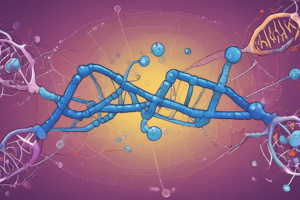Podcast
Questions and Answers
What type of blotting technique is used for detecting proteins?
What type of blotting technique is used for detecting proteins?
- Eastern Blot
- Northern Blot
- Western Blot (correct)
- Southern Blot
Which method is required for separating nucleic acids according to their size?
Which method is required for separating nucleic acids according to their size?
- Spectrophotometry
- Centrifugation
- Electrophoresis on agarose gel (correct)
- Filter paper chromatography
What is the purpose of hybridization in the detection of nucleic acids?
What is the purpose of hybridization in the detection of nucleic acids?
- To fragment nucleic acids
- To denature double-stranded DNA
- To amplify nucleic acids
- To enable binding of DNA probes (correct)
What type of molecules are oligonucleotides?
What type of molecules are oligonucleotides?
Why is it necessary to fragment DNA before transferring it to a solid support?
Why is it necessary to fragment DNA before transferring it to a solid support?
What does Southern Blot primarily detect?
What does Southern Blot primarily detect?
How is mRNA expression determined in qRT-PCR?
How is mRNA expression determined in qRT-PCR?
What role does the clamp domain play in transcription by RNA Pol II?
What role does the clamp domain play in transcription by RNA Pol II?
What process is indicated by the detection of spatiotemporal information about gene expression?
What process is indicated by the detection of spatiotemporal information about gene expression?
Which step follows the initiation phase of transcription?
Which step follows the initiation phase of transcription?
What does RNA-Seq allow researchers to analyze?
What does RNA-Seq allow researchers to analyze?
What is the underlying purpose of linker scanning mutagenesis?
What is the underlying purpose of linker scanning mutagenesis?
What event occurs during the termination phase of transcription?
What event occurs during the termination phase of transcription?
What is the function of the Carboxyl Terminal Domain (CTD) in RNA Pol II?
What is the function of the Carboxyl Terminal Domain (CTD) in RNA Pol II?
Which of the following is a key characteristic of eukaryotic transcription?
Which of the following is a key characteristic of eukaryotic transcription?
What is the primary purpose of transferring nucleic acids to a solid state support during detection?
What is the primary purpose of transferring nucleic acids to a solid state support during detection?
Which component is essential for generating DNA probes used in nucleic acid detection?
Which component is essential for generating DNA probes used in nucleic acid detection?
What characteristic of agarose gel is significant in the separation of nucleic acids?
What characteristic of agarose gel is significant in the separation of nucleic acids?
Which type of nucleic acid does Northern Blot specifically detect?
Which type of nucleic acid does Northern Blot specifically detect?
What is a reason for the long DNA molecules needing fragmentation before transfer to a solid support?
What is a reason for the long DNA molecules needing fragmentation before transfer to a solid support?
What defines the differences in DNA sequences detectable by Southern Blotting?
What defines the differences in DNA sequences detectable by Southern Blotting?
Which of the following indicates what occurs during the elongation phase of transcription?
Which of the following indicates what occurs during the elongation phase of transcription?
What methodology allows for the measurement of RNA expression through a fluorescence signal in real-time?
What methodology allows for the measurement of RNA expression through a fluorescence signal in real-time?
What does RNA-Seq analyze in a sample?
What does RNA-Seq analyze in a sample?
In the context of transcription regulation, what does linker scanning mutagenesis help identify?
In the context of transcription regulation, what does linker scanning mutagenesis help identify?
How is spatiotemporal information about gene expression obtained through Northern Blotting?
How is spatiotemporal information about gene expression obtained through Northern Blotting?
What is a characteristic feature of the Carboxyl Terminal Domain (CTD) during transcription?
What is a characteristic feature of the Carboxyl Terminal Domain (CTD) during transcription?
Which function do enhancers serve in relation to transcription regulation?
Which function do enhancers serve in relation to transcription regulation?
Which signal is indicative of higher amounts of mRNA in qRT-PCR methodology?
Which signal is indicative of higher amounts of mRNA in qRT-PCR methodology?
What is the role of the clamp domain in RNA Pol II’s function during transcription?
What is the role of the clamp domain in RNA Pol II’s function during transcription?
Flashcards
Southern Blot
Southern Blot
A technique used to detect specific DNA sequences in a sample.
Nucleic Acid Probe
Nucleic Acid Probe
A short single or double-stranded DNA or RNA molecule used to find a specific nucleic acid sequence.
Agarose Gel Electrophoresis
Agarose Gel Electrophoresis
Technique separating nucleic acids by size.
Oligonucleotide
Oligonucleotide
Signup and view all the flashcards
Nitrocellulose
Nitrocellulose
Signup and view all the flashcards
Restriction Fragment Length Polymorphism (RFLP)
Restriction Fragment Length Polymorphism (RFLP)
Signup and view all the flashcards
Spatiotemporal Gene Expression
Spatiotemporal Gene Expression
Signup and view all the flashcards
qRT-PCR
qRT-PCR
Signup and view all the flashcards
Ct Value
Ct Value
Signup and view all the flashcards
RNA-Seq
RNA-Seq
Signup and view all the flashcards
Transcriptome
Transcriptome
Signup and view all the flashcards
Transcription Initiation
Transcription Initiation
Signup and view all the flashcards
Transcription Elongation
Transcription Elongation
Signup and view all the flashcards
Western Blot
Western Blot
Signup and view all the flashcards
Probe Generation
Probe Generation
Signup and view all the flashcards
Transfer to Solid Support
Transfer to Solid Support
Signup and view all the flashcards
What is a Southern Blot used for?
What is a Southern Blot used for?
Signup and view all the flashcards
What does a Northern Blot tell us?
What does a Northern Blot tell us?
Signup and view all the flashcards
What is qRT-PCR?
What is qRT-PCR?
Signup and view all the flashcards
What does a lower Ct value in qRT-PCR mean?
What does a lower Ct value in qRT-PCR mean?
Signup and view all the flashcards
Transcription Termination
Transcription Termination
Signup and view all the flashcards
What does DNA looping allow for in transcription?
What does DNA looping allow for in transcription?
Signup and view all the flashcards
What is the Clamp Domain?
What is the Clamp Domain?
Signup and view all the flashcards
Study Notes
Nucleic Acids & Transcription
- Tutorials now follow the same schedule as lectures
- SciLearn answers are not posted online; discuss with a TA during Q&A sessions
- Instructor office hours: Send questions by Wednesday, 3 pm
- Midterm results (tentative) will be released next week
- Questions/concerns should be directed to the assessment email, not the general TA email
Nucleic Acid Detection
- Nucleic Acid detection methods include Southern, Northern, and Western blots
- Southern blot: DNA detection; uses restriction enzymes for fragment separation
- Northern blot: RNA detection
- Western blot: Protein detection; uses acrylamide gel, denatures polypeptides
- Probes (single-stranded DNA or RNA) hybridize with the target, allowing for detection in blotting techniques. Probes are labelled to amplify signals.
- Nitrocellulose or Nylon is used as a solid phase support to transfer the separated nucleic acids from the gel for easier handling and better access to probes/antibodies
Detecting Nucleic Acids
- Complex mixtures of macromolecules are separated based on size using agarose gel electrophoresis
- Probes specific to the target nucleic acid are used
- Hybridization with a specific probe identifies nucleic acids of interest
- Nitrocellulose or nylon membranes can bind to the nucleic acid to aid in easy handling and access for probes or antibodies
- Target Detection on membrane is visualized through autoradiography
Probe Generation
- Oligonucleotides are short, single-stranded or double-stranded DNA/RNA molecules
- Oligonucleotides can be labelled for detection
- Polynucleotide Kinase (PNK) can be used to label oligonucleotides
- Polymerase Chain Reaction (PCR) can be used to produce radio- or fluorescence-labeled DNA probes
Transfer of Nucleic Acids to Solid Support
- Nucleic acids are separated according to size on agarose gels
- Separated molecules are transferred to a solid support (e.g., nitrocellulose) for handling and access to probes/antibodies
- DNA is fragmented to easier handling
Southern Blot: Restriction Fragment Length Polymorphisms (RFLPs)
- Differences in DNA sequences can be detected by the presence of fragments of different lengths
- these differing fragment lengths arise from DNA digestion with specific restriction enzymes
- RFLPs can be used for diagnostic or relatedness purposes
Northern Blot: Differential gene expression
- RNA is heated to eliminate secondary structure before electrophoresis
- RNA samples are transferred to a solid support (e.g., nitrocellulose)
- Visualized by detecting hybridization of probes to specific RNA molecules
- This method is used to study spatiotemporal information about gene expression patterns. Differences in RNA expression levels under different conditions (e.g, different tissues, development stages) are revealed
qRT-PCR: Another way to determine mRNA expression
- mRNA is converted to cDNA using reverse transcription
- Fluorescent dyes are incorporated into the cDNA signal, which is measured as a function of amplification time
- The faster the reaction, the more cDNA, and the more mRNA is present.
RNA-Seq: Determining mRNA expression
- RNA-Seq is a technique for determining global gene expression in a sample
- Complete transcriptome, the set of all RNA transcripts, is determined for an individual or population of cells
- RNA is converted to cDNA and amplified
- Using next-generation sequencing (NGS), specific sequences on the cDNA are identified
- Provides a complete picture of global mRNA expression profiles
Eukaryotic Transcription (RNA Pol II)
- Eukaryotic cells have 3 types of RNA Polymerases (I, II, III)
- RNA polymerase II transcribes a range of genes to synthesize mRNA, snRNAs and other small RNAs.
Transcription (DNA to RNA)
- Initiation: RNA polymerase binds to promoter; DNA is locally denatured; first phosphodiester bond is formed.
- Elongation: RNA polymerase moves away from the start site; DNA template is copied
- Termination: RNA polymerase encounters a transcription stop site, releasing the completed RNA strand and dissociating from the DNA
Transcription Regulation
- Promoters are regions of DNA where proteins bind to start transcription
- Enhancers are DNA elements that affect transcriptional ability of RNA Polymerase
- DNA loops allow enhancers to affect transcription regions far from them. Up/Downstream refers to the direction from the transcription start site
Transcription
- Eukaryotes have 3 well-conserved, multimeric RNA polymerases
- RNA Pol I is responsible for almost all rRNA of the cell
- RNA Pol II synthesizes mRNA and certain types of small noncoding RNAs
- RNA Pol III synthesizes tRNAs and certain ribosomal components
Promoter Start Sites
- The TATA box is located upstream (10-35 bp) of the transcription start site (TSS)
- TBp (TATA-binding protein) binds to the minor groove of DNA and disrupts double helix structure, aiding Pol III transcription
Linker Scanning Mutagenesis
- Used to determine promoter elements - introduce mutations in reporter constructs
- Compare expression of reporter mRNA from each mutant to identify required subregions of the promoter region for activation of transcription
Studying That Suits You
Use AI to generate personalized quizzes and flashcards to suit your learning preferences.




